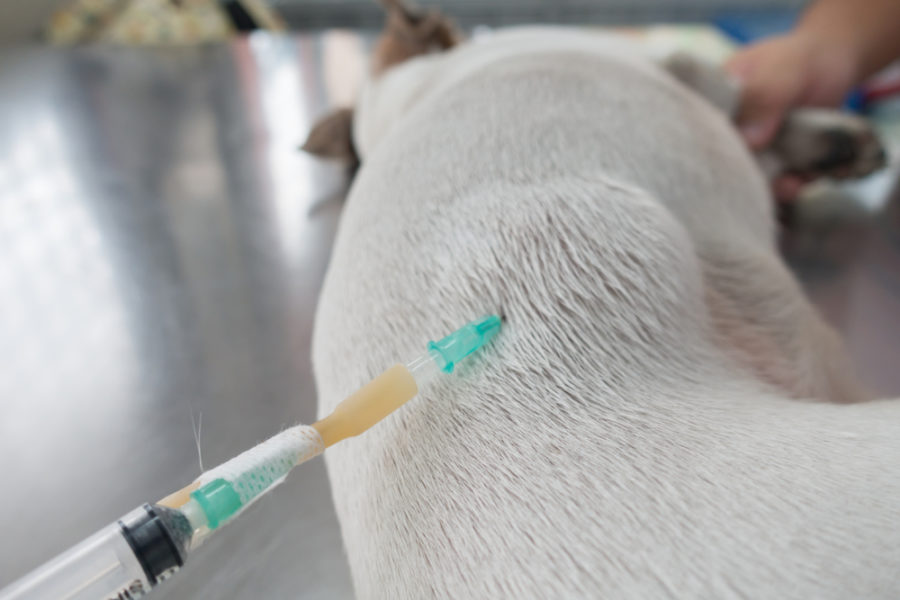The market is awash in pet supplements, so if you’re having a hard time figuring out what your dog or cat really needs, it’s not surprising. Here’s an overview of the top basic supplements every dog or cat should have.
The foundation of any health care program for dogs and cats, regardless of age and breed, is a healthy diet, well-chosen and appropriate supplements, minimal vaccines and medications, and veterinary check-ups. Regular testing can help diagnose disease in its early stages, and allow for any tweaking of diet and supplements. This article features my basic supplement approach to a healthy dog or cat.
Basic supplements include a vitamin-mineral product that also provides immune and antioxidant support, a fatty acid, and an enzyme and probiotic combination. For older animals, a choline supplement should be added, as it may delay the onset of cognitive disorder.
1. VITAMINS, MINERALS, AND JOINT SUPPORT
The first basic supplement contains vitamins and minerals, as well as small amounts of glucosamine and chondroitin for joint support. We use a product in my own line called Advanced Revitalizing Formula. It provides extra vitamins and minerals in addition
to those found in the diet, while also supporting digestion, skin and coat health, and overall wellness.
 2. ENZYMES AND PROBIOTICS
2. ENZYMES AND PROBIOTICS
Another favored nutraceutical at my practice is an enzyme-probiotic combination:
• Traditionally, enzymes are used in supplemental form to improve or increase digestion and nutrient absorption. Enzymes used to aid in digestion and absorption include proteases to break down proteins; carbohydrases (such as amylase), which break down carbohydrates; and lipases for breaking down fats. Digestive enzymes are very specific as to the types of food they break down, as well as the conditions under which they work.
Digestive enzymes can be derived from pancreatic, plant, or microbial sources (e.g. bacteria or fungi). While pancreatic enzymes exert their actions mainly in the small intestines, plant and microbial enzymes begin digesting foods immediately after ingestion (and even likely before ingestion if the food-enzyme combination has
incubated for several minutes prior to being consumed). Supplemental enzymes of animal origin (pancreatic) are only active in the alkaline pH of the intestine, and may be permanently inactivated or denatured in the lower pH of the stomach, whereas microbial and plant enzymes survive the acid environment of the stomach and are also active at a low pH.
Supplemental enzymes aid in digestion and nutrient absorption, especially when the body’s digestive processes become exhausted or inefficient, such as during periods of stress or disease (especially diseases of the gastrointestinal tract, including acute gastroenteritis, pancreatitis, liver disease, and inflammatory bowel disease).
Did You Know? Enzymes may also be helpful for cancer, allergies, and arthritis.
• Probiotics are living, non-harmful (and actually healthy) bacteria and yeasts, many of which are a part of the dog or cat’s GI microbiome. Probiotics can assist with healing in a variety of ways, including the production of healthy fatty acids, decreased attachment of harmful bacteria and yeasts to the intestinal walls, increased antibody production, immune support, the restoration of healthy GI flora, and inflammation reduction.
As a result, probiotics are useful for treating dogs and cats with a variety of medical problems, including leaky gut syndrome, acute non-specific gastroenteritis, antibiotic or other medication-induced diarrhea (from NSAIDs, corticosteroids, chemotherapy,
etc.), allergies, stress, obesity, neurodegenerative disorders, high cholesterol levels, inflammatory and irritable bowel disorders, GI infections and parasite infestations. Probiotics may also be helpful for middle-aged and older dogs and cats, since GI microbial diversity diminishes with aging.
3. FATTY ACIDS
A good fatty acid (fish oil) supplement is also important. There are many brands on the market; I prefer those that offer the flexibility of providing the supplement either as a liquid (pump) or gel capsule. Fish oil is a popular source of Omega-3 fatty acids; the active ingredients in fish oil are docosahexaenoic acid (DHA) and eicosapentaenoic acid (EPA.)
Phytoplankton, which serves as a food source for fish, is the source of EPA and DHA. Fish oil tends to be derived from cold water fish rich in EPA and DHA, such as wild (not farmed) salmon, mackerel, sardines, and herring. Fish oil is beneficial for the treatment of heart disease and may reduce atherosclerosis, thrombosis (blood clots), coronary heart disease, arrhythmias, heart failure, sudden cardiac death, and stroke.
Did You Know? Due to its anti-inflammatory effects, fish oil is often used in dogs and cats for the treatment of skin problems, heart disease, arthritis, inflammatory bowel disease, cancer, autoimmune diseases, and kidney disease.
Fish oil may reduce the side effects of chemotherapy (including cardiotoxicity) and radiation therapy in cancer patients, decrease cancer growth and metastasis, and reduce wasting in under-nourished animals. Fish oil may cause a modest lowering of blood pressure and may be useful in people and animals with hypertensive disorders.
4. CHOLINE
For older dogs and cats (typically five years of age and up), a choline (phosphatidylcholine) supplement assists with aging changes that affect the brain (and can lead to cognitive disorder.)
Choline is a component of several major phospholipids that are critical for normal cell membrane structure and function. The body uses choline to maintain water balance; as a source of methyl-groups (e.g. for methionine formation); to control cell growth and gene expression; as a component of lung surfactant; and most importantly, to produce the major nerve transmitter, acetylcholine. Choline donates methyl groups to convert homocysteine to methionine, which may reduce the risk of cardiovascular disease (by lowering homocysteine levels).
Choline is used to treat high cholesterol, improve memory, and protect the liver. Choline supplementation may prevent fatty liver syndrome (especially in diabetics), helps prevent or treat cognitive disorder, and supports liver function. It may reduce insulin requirements in diabetics. Choline also functions as a constituent of plasmalogens, which are abundant in mitochondria and sphingomyelin, and can reduce seizure frequency.
As mentioned earlier, other supplements can be used as needed, based on the results of diagnostic testing and regular veterinary health exams.
Supplements can add to a dog or cat’s health and longevity. Under the guidance of your own holistic or integrative veterinarian, I hope you will consider the supplements recommended in this article.









